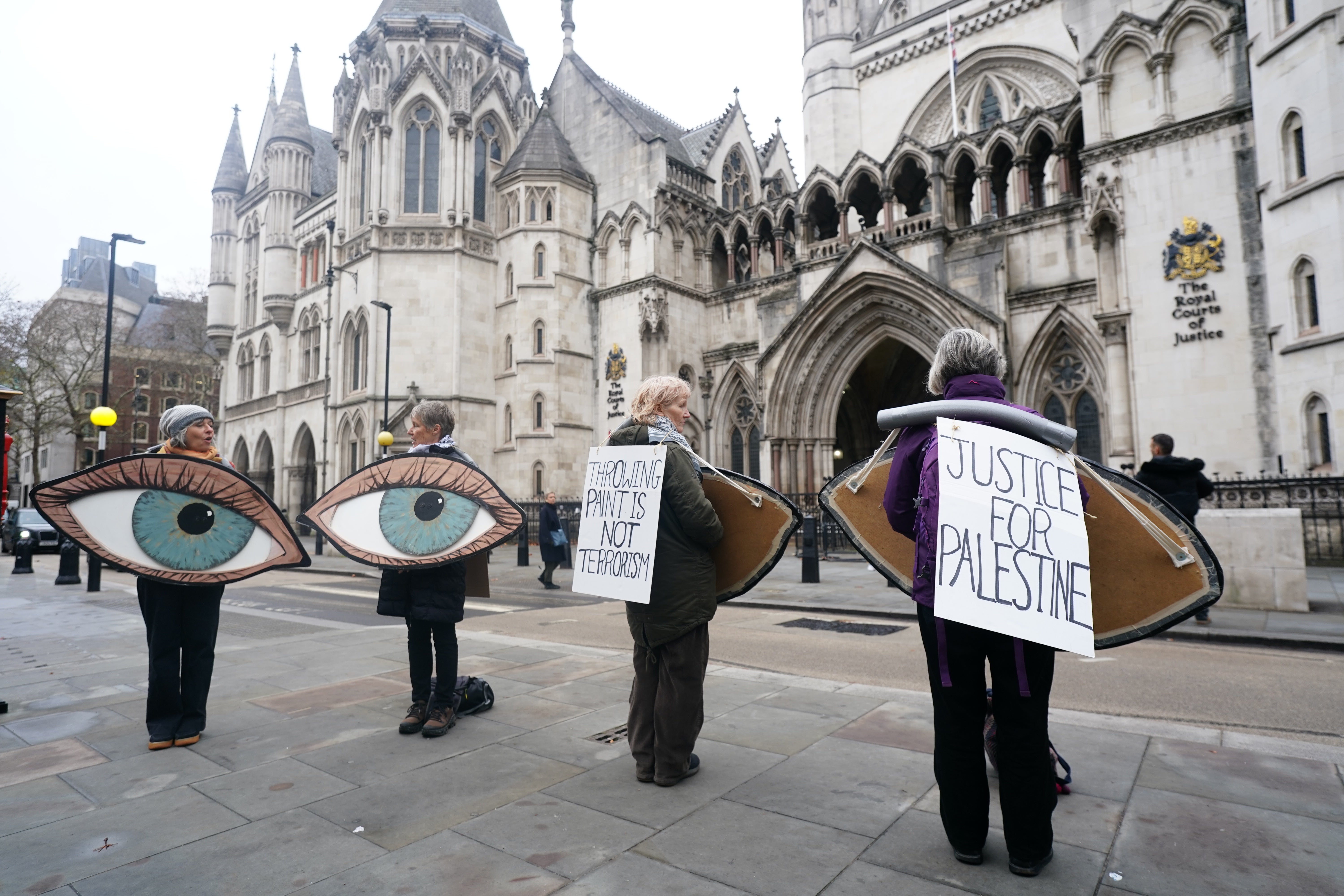- News
- UK
- Home News
UN special rapporteur on human rights says the ban is ‘an unnecessary and disproportionate restriction’ on fundamental human rights
Holly BancroftHome Affairs Correspondent Friday 28 November 2025 12:36 GMTComments
 ClosePalestine Action protest sees at least 90 arrested
ClosePalestine Action protest sees at least 90 arrested
Get the free Morning Headlines email for news from our reporters across the world
Sign up to our free Morning Headlines email
Sign up to our free Morning Headlines email
 Email*SIGN UP
Email*SIGN UPI would like to be emailed about offers, events and updates from The Independent. Read our Privacy notice
The UK’s decision to proscribe Palestine Action as a terrorist organisation has been likened to authoritarian crackdowns in Russia by a UN expert.
The UN special rapporteur on counterterrorism and human rights, Professor Ben Saul, said the UK government’s ban on the direct action protest group is “an unnecessary and disproportionate restriction” on “fundamental human rights”.
In evidence submitted to the High Court, he warned that the move “sets a precedent” for further crackdown on other protest movements in the UK, such as climate activists.
Co-founder of Palestine Action, Huda Ammori, has taken the government to court over Yvette Cooper’s decision in June to proscribe the group as a terror organisation when she was home secretary.
Alarmed by the move, Prof Saul, an independent expert appointed by the UN Human Rights Council to monitor abuses, has intervened in the court case.
He told the court that the UK’s terror ban was “out of step with comparable liberal democracies, including Europe”. He wrote in a witness statement: “Abuse of laws to proscribe organisations as terrorist that are not genuinely so has more commonly occurred in States that are authoritarian and lack legal and political cultures of respect for human rights, legality, due process and independent judicial safeguards”.
 open image in galleryCampaigners outside the Royal Courts of Justice, central London, where Palestine Action co-founder Huda Ammori is taking legal action against the Home Office (PA)
open image in galleryCampaigners outside the Royal Courts of Justice, central London, where Palestine Action co-founder Huda Ammori is taking legal action against the Home Office (PA)He continued: “These include egregious abuses, such as Russia’s listing of the global LGBTQI movement as an ‘extremist’ organisation. Organisations must never be listed as terrorist for engaging in protected speech or legitimate activities in defence of human rights”.
He told the court that the ban was not proportional to the activities of Palestine Action, saying that the proscription “is not justified based on the actions of a small minority of individuals involved with it”. Prof Saul added that the ban would have a “widespread chilling effect” on people’s legitimate right to protest.
Raza Husain KC, for Ms Ammori, told the High Court on Wednesday that “this is not a group that advocates violence”, saying any examples of serious violence against property or person “are not the norm, they are rare”.
The ban has since led to thousands of people being arrested under terror laws for holding up signs saying they oppose genocide and support Palestine Action.
 open image in galleryPalestine Action supporters, outside Royal Courts of Justice this week. The final day of Ms Ammori’s case will be heard next Tuesday (PA)
open image in galleryPalestine Action supporters, outside Royal Courts of Justice this week. The final day of Ms Ammori’s case will be heard next Tuesday (PA)The group was proscribed after an incident in June where activists broke into RAF Brize Norton in Oxfordshire and sprayed two military planes with red paint. Ms Cooper cited the group’s protest at a weapons equipment factory in Glasgow in 2022, and its targeting of Israeli defence technology company Elbit Systems UK in Bristol in her reasoning for proscribing Palestine Action.
Woolwich Crown Court heard on Monday that an activist allegedly hit a police sergeant with a sledgehammer during the attack on Elbit in Bristol in August last year.
Government witness statements submitted in the High Court case show that Ms Cooper faltered over her decision to proscribe Palestine Action, and paused the initial go-ahead to get further information.
Jonathan Sinclair, director of national security in the Homeland Security Group at the Home Office, said that Ms Cooper decided on 14 May this year to proscribe Palestine Action, but then paused this decision two days later after requesting further information.
One month later, on 20 June, Ms Cooper confirmed that she would again agree to proscribe the group.
Sir James Eadie KC, for the government, said that a debate about how a terrorist organisation is defined was for parliament to decide.
The barrister told the court: “In our democratic society, these issues are matters for parliament to judge and parliament’s judgment is expressed in the current legislation.”
In written submissions, Sir James said that the proscription’s aim is “stifling organisations concerned in terrorism and for members of the public to face criminal liability for joining or supporting such organisations”.
He continued: “That serves to ensure proscribed organisations are deprived of the oxygen of publicity as well as both vocal and financial support.”
The case, before Dame Victoria Sharp, Mr Justice Swift and Mrs Justice Steyn, is due to conclude on 2 December, with a decision expected in writing at a later date.
More about
Yvette CooperHigh CourtPalestine ActionHuman RightscounterterrorismJoin our commenting forum
Join thought-provoking conversations, follow other Independent readers and see their replies
Comments